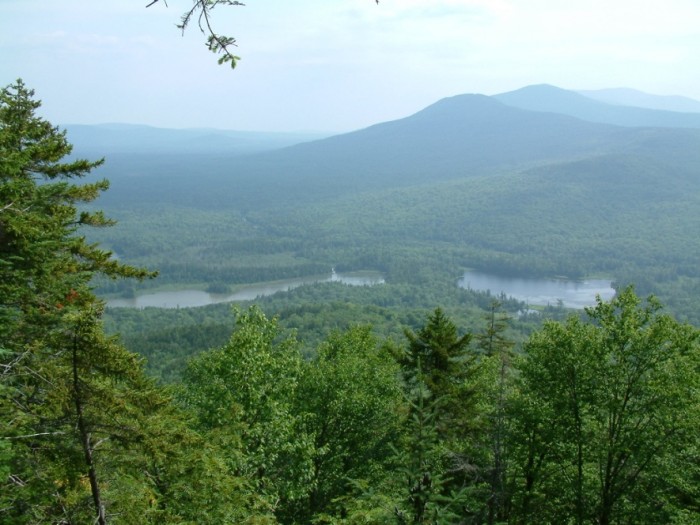
Image Credit: Appalachian Mountain Club
written by Kasey Krifka, The Climate Trust
The Climate Trust recently purchased carbon offsets from The Appalachian Mountain Club’s (AMC) Katahdin Iron Works conservation property in Maine. By encouraging natural forest growth on AMC’s 10,000-acre ecological reserve, the project preserves stored carbon in the forest and enables an additional revenue stream through the sale of carbon offsets. AMC’s property was established as part of the organization’s Maine Woods Initiative—a strategy for land conservation in the 100-Mile Wilderness region. The initial offset sale represents over 100,000 carbon reduction tons—the equivalent of removing 21,000 gasoline-powered passenger cars from the road—which have been retired on behalf of The Trust’s Oregon and Massachusetts Programs.
Forests cover about one-third of the United States and are of great importance as habitat for wildlife, to clean air and water, to supply timber and other products, and for recreation. However, these vital lands face continued pressure from development and conversion for other uses. The Northern Forest is threatened by fragmentation and development. Since the 1990s, when timber companies—who had owned large tracts of forest—began to sell these lands, the threat of fragmentation and loss of functional ecosystems and habitat has grown. Carbon markets provide an important incentive to preserve intact, healthy forests.
The carbon offsets have been verified under the Forest Project Protocol of the Climate Action Reserve. AMC is committed to continued monitoring and verification of the project to ensure that its climate benefits persist for a period of 100 years following issuance of any carbon offsets for greenhouse gas reductions achieved by the project. The protocol also includes standards that ensure the project is sustainably managed and ecological “co-benefits,” such as wildlife habitat and soil and water quality, are maintained.
“We see carbon credits as having the double benefit of supporting our overall climate policy by reducing atmospheric carbon, and providing financial support to conservation projects like our Maine Woods Initiative,” said Walter Graff, Senior Vice President of AMC. “We are pleased to be among the early users in the conservation community of forest carbon credits to support land conservation in New England.”
The Climate Trust was able to support this project because of funding received from a number of partners.
“The Climate Trust invested in Maine because the local environmental and social benefits such as recreation, forest education opportunities for children, wildlife habitat and water quality improvements perfectly fit our focus on land-based multi-benefit projects,” said Sheldon Zakreski, Director of Programs for The Climate Trust. “The offsets purchased from AMC’s project have enabled us to effectively fulfill our obligations for an innovative effort in Massachusetts several years ago to address carbon emissions from fossil-fired plants. This is a prime example of how states can partner together to tackle climate change.”
Proceeds from the sale of these offsets will be directed toward AMC’s conservation programs in Maine.
The Maine Woods Initiative is AMC’s strategy for land conservation in the 100-Mile Wilderness region, addressing regional ecological and economic needs through outdoor recreation, resource protection, sustainable forestry, and community partnerships. As part of this initiative, the Appalachian Mountain Club acquired and permanently protected 66,500 acres of forest land in the 100-Mile Wilderness region of Maine. Working with what was formerly industrial forest, AMC has set aside 21,000 acres as permanent ecological reserves where no timber harvesting will take place and the forest will be allowed to grow naturally. Other smaller, no-harvest areas have been designated to protect specific ecological, recreational or scenic values. The remaining area, about half of the property, is managed using sustainable forestry techniques.
More About The Trust’s Oregon Program:
As the nation’s first compliance carbon provider and manager, The Trust has a long history of meeting the unique needs of utilities and their stakeholders. We remain the only organization qualified to administer the Oregon Carbon Dioxide Standard, the first legislation in the nation to curb carbon emissions. New fossil fuel-fired power plants provide us with funding to comply with the law and we invest those funds into high quality projects that reduce pollution.
Since its inception, The Trust has managed over $19 million in carbon financing for greenhouse gas emission reduction projects. The cornerstone of our business, the Oregon Program, has built a strong legacy of innovation that delivers results for our compliance partners and the environment year after year.
The majority of our projects and programs are locally focused, enabling The Trust to grow strong grassroots support for climate action. In fact, 60% of the money we invest on behalf of utilities stays in Oregon. Additionally, our Oregon-based projects are from diverse sectors, including transportation, renewable energy, forestry, biogas, energy efficiency, and landfill & waste.
Tags: Climate Action Offsetter, offsets




